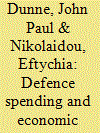| Srl | Item |
| 1 |
ID:
116060


|
|
|
|
|
| Publication |
2012.
|
| Summary/Abstract |
Over the last 30?years, there has been an impressive amount of empirical work on the defence-growth nexus, using different methodologies, models and econometric techniques and focusing on individual case studies, cross-country studies or panel data studies. Despite the number and the variety of studies, the evidence on the defence-growth relationship is still far from conclusive. Rather surprisingly, very limited work has been published in the relevant literature for the European Union despite the continuous discussions for a Common European Defence Policy that would require an assessment of the economic effects of defence in this region. To fill in the gap in the literature, this paper employs an augmented Solow-Swan model and estimates it both with panel and time series methods to provide empirical evidence on the economic effects of defence spending in the EU15 over the period 1961-2007. Overall, evidence derived from both panel and time series methods is consistent and suggests that military burden does not promote economic growth in this region.
|
|
|
|
|
|
|
|
|
|
|
|
|
|
|
|
| 2 |
ID:
083241


|
|
|
|
|
| Publication |
2008.
|
| Summary/Abstract |
In recent years, there has been a growing number of studies that investigate the economic effects of military spending using a variety of estimation methods and focusing either on individual countries or on groups of relatively homogeneous countries. The situation is not the same as far as the demand for military expenditure is concerned, where less attention has been given and the majority of empirical studies have focused on individual countries, with only a few focusing on groups of countries and employing cross-sectional or panel data approaches. A region that has not attracted any research interest regarding the determinants of military expenditure is the European Union (EU) with the exception of individual country studies (mainly for the UK, Greece, France, Spain, Portugal). This paper argues that understanding the determinants of military spending in these countries is very important, especially given the discussions in recent years towards the development of a Common European Security and Defence Policy (CESDP). It then follows Dunne et al. (2003) and employs the Autoregressive Distributed Lag (ARDL) approach to cointegration to estimate a general model of aggregate defence spending for each of the 15 core EU countries over the period 1961-2005. The findings indicate that there is very little uniformity in the factors that determine each country's demand for military expenditure, something that needs to be borne in mind by policy makers when burden-sharing issues are considered in the development of the CESDP.
|
|
|
|
|
|
|
|
|
|
|
|
|
|
|
|